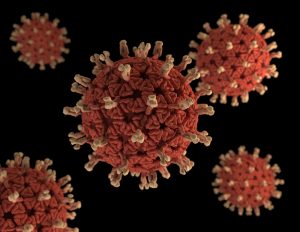NewsDesk @bactiman63
A survey coordinated by the World Health Organization (WHO) with the participation of the Oswaldo Cruz Foundation (Fiocruz) reveals that, even with the availability of vaccines, rotavirus is still responsible for most cases of severe diarrhea in children under five years of age, mainly in developing countries.

Image/CDC/Jessica A. Allen/Alliza Eckerd.
Transmission is via the fecal-oral route, through person-to-person contact, ingestion of contaminated water and food, contact with contaminated objects, and airborne aerosol spread. Furthermore, rotavirus can be found in high concentrations in the feces of infected children.
According to the study, out of 20,400 cases in which dehydration was present and the severity was estimated, 6,600 (32.6%) had severe dehydration. Most cases were accompanied by vomiting and dehydration, and almost all patients received some form of rehydration therapy in the hospital.
Importance of vaccination
Rotavirus causes more than 200,000 deaths per year worldwide and the survey results, according to Fiocruz, reinforce the importance of immunization, as rotavirus is responsible for 33% of hospitalizations.
In Brazil, in 2022, according to preliminary data from the Information System of the National Immunization Program, 3.9 million doses of the vaccine against rotavirus were applied, representing 73% of vaccination coverage. It is reiterated that the vaccination target for this vaccine is 90%. The target population is children under one year old.
“The vaccination scheme against human rotavirus (VORH) is a two-dose, administered exclusively orally, and is recommended for children aged 2 and 4 months, with the first dose being administered from 1 month and older. 15 days up to 3 months and 15 days and the second dose can be administered from 3 months and 15 days up to 7 months and 29 days”, explains the secretary of Surveillance in Health and Environment, Ethel Maciel.
Subscribe to Outbreak News TV on YouTube
People of all ages are susceptible to rotavirus infection, however, acute gastroenteritis (inflammation of the stomach and intestines) occurs most often in children under five. Regarding newborns, rotavirus infections are usually characterized by being milder or asymptomatic, probably due to breastfeeding and maternal antibodies transferred by the mother.
In addition to vaccination, the Ministry of Health recommends other means of preventing rotavirus infection:
- Always wash your hands with clean water and soap before and after using the bathroom, changing diapers, handling/preparing food, breastfeeding, touching animals;
- Wash and disinfect surfaces, utensils and equipment used in food preparation;
- Protect food and kitchen areas from insects, pets and other animals (store food in closed containers);
- Store treated water in clean, narrow-mouthed containers to avoid recontamination;
- Do not use water from contaminated streams, rivers, cacimbas or wells;
- Bag and keep the lid closed at all times. When there is no garbage collection, it must be buried;
- Always use the toilet, but if this is not possible, always bury the feces away from water courses; It is
- Maintain breastfeeding – as it increases children’s resistance against diarrhea – avoiding early weaning.
Gastroenteritis caused by rotavirus is self-limiting, with a tendency to spontaneously progress to cure, especially in people with healthy immune systems. In this context, treatment consists of preventing and correcting dehydration and electrolyte imbalance, in addition to treating other signs and symptoms, such as nausea, vomiting and fever. A normal diet should be maintained and the use of antimicrobials or antidiarrheals is not recommended.
- Taiwan reports 1st severe enterovirus D68 case of the year
- Bolivia dengue cases top 3,000
- Paraguay: More than 8,000 Chikungunya cases reported in past 3 weeks, Hospitals reorganize
- France: Listeria infections reported linked to Jay & Joy vegetable alternatives to cheese
- Burundi reports progressive increase in malaria in recent years
- India Newswire: Chickenpox in Kolkata, Polio-free for 12 years
- Nipah virus infections at highest numbers in Bangladesh since 2015
- Dominican Republic: Four children hospitalized with diphtheria in Santo Domingo

